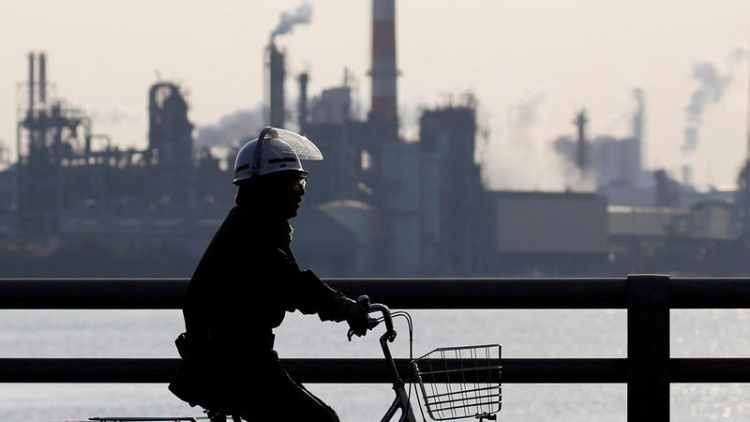By Stanley White
TOKYO (Reuters) - Japan's industrial output rose in August for the first time in four months as some factories resumed activity following heavy rain and floods, but uncertainty over the likely result of trade talks between Japan and the United States clouds the outlook.
Trade ministry data out on Friday showed factory output rose 0.7 percent in August from the previous month, less than economists' median estimate of a 1.5 percent rise and following 0.2 percent decline in the previous month.
Manufacturers surveyed by the trade ministry expect output to rise 2.7 percent in September and 1.7 percent in October.
Industrial output should continue to grow in the future but there are concerns that high inventories of electronic parts will weigh on production.
The chance that Japan will shift more auto production to the United States is another downside risk for output.
"Output this quarter will not be as strong as the previous quarter because of dip in demand for electronic parts," said Kentaro Arita, senior economist at Mizuho Research Institute.
"There is also a chance that Japan will come under pressure to shift more production to the United States if U.S.-bound exports increase."
Output rose in August due to a 5.2 percent increase in auto production and a 5.6 percent increase in production of gear used to make semiconductors and flat-panel displays, the data showed.
However, output of electronic parts and devices fell 8.8 percent in August, the biggest decline in 2 1/2 years. Some economists worry that makers of these goods will cut output further because of rising inventories.
The unemployment rate fell to 2.4 percent in August from 2.5 percent in the previous month, while the jobs-to-applicants ratio held steady at 1.63 jobs per applicant from, the highest level since January 1974, separate data showed.
Despite the solid economy and tight labour market, inflation is struggling to accelerate.
Tokyo's core consumer price index (CPI), which includes oil products but excludes fresh food prices, rose 1.0 percent in the year to September, versus a 0.9 percent rise expected by economists and less than half the central bank's 2 percent target.
The Tokyo index is available a month before nationwide core CPI, and serves as a leading indicator of consumer inflation.
Japanese retail sales rose 2.7 percent in August from a year earlier, compared with a median market forecast for a 2.1 percent increase, separate data showed on Friday.
U.S. President Donald Trump and Japanese Prime Minister Shinzo Abe agreed this week to start trade talks in an arrangement that, for now, protects Japanese automakers from further tariffs, seen as a major threat to the export-dependent economy.
Still, there are lingering concerns that Japan will have to dramatically lower auto exports to the U.S. market and greatly increase the number of cars in makes in the United States to meet Trump's goal of creating more jobs and lowering the U.S. trade deficit.
(Reporting by Stanley White; Editing by Eric Meijer)



